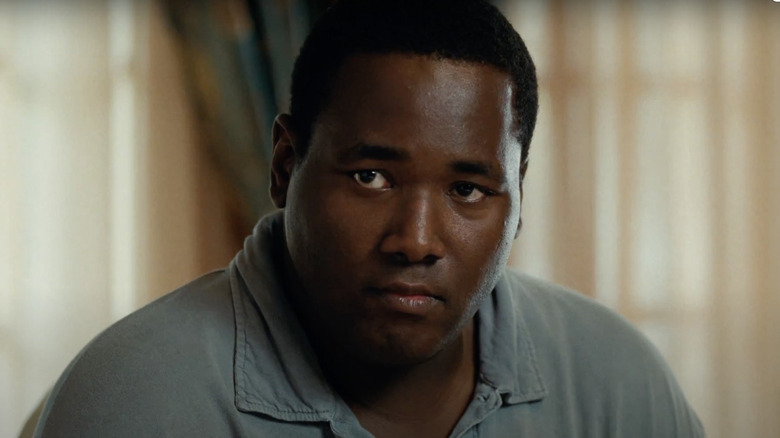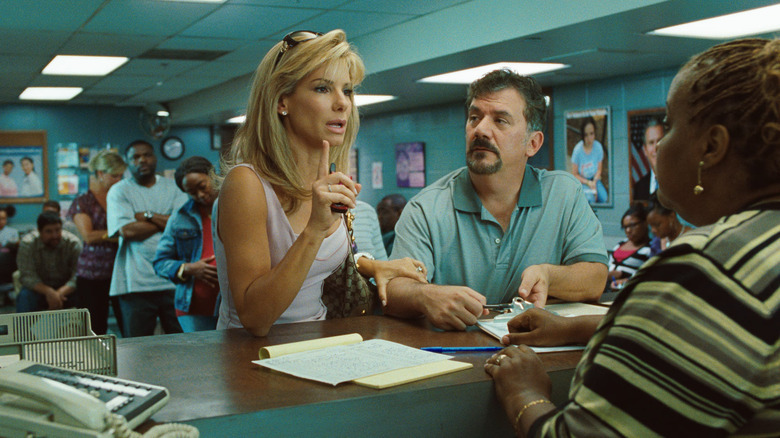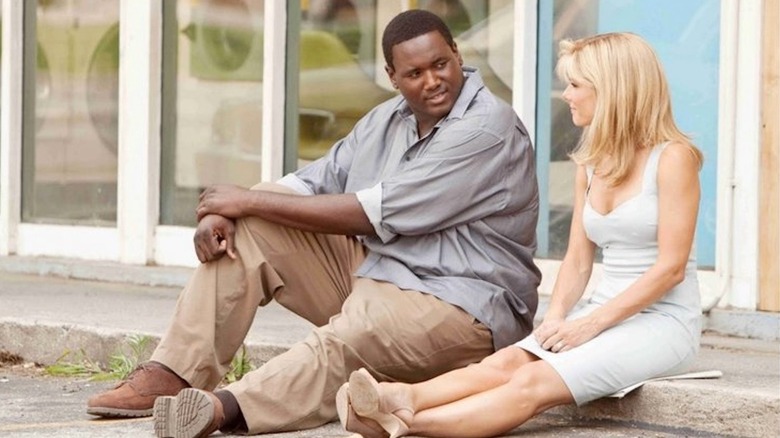Subject Of The Blind Side Alleges Film Is Based On Lie, And Made Everyone Rich Except Him
Hollywood loves feel-good, based-on-real-life sports dramas, and isn't shy about drastically altering the facts to mine these tales for maximum stand-up-and-cheer potential. The scrappy high-school basketball underdogs in "Hoosiers" were, despite the school's small enrollment, actually a top team in the state during that supposed Cinderella season (which is why the filmmakers opted to set the film in a fictional town). "Remember the Titans" is riddled with inaccuracies, one of the most egregious being that T.C. Williams High School's climactic game against George C. Marshall High occurred in the middle of the season. And while the title character of "Rudy" did fulfill his dream of suiting up for his beloved Notre Dame Fighting Irish, retired NFL quarterback Joe Montana, who was on the team at the time, says the dramatic uniform-dumping scene is a pure fabrication (also, while Rudy was carried off the field at the end of the game, this was evidently a sarcastic gesture).
In most cases, no one gets hurt by a filmmaker taking a liberty or ten to tell a more stirring story. 2006's "The Blind Side," however, may be a truly disturbing exception.
According to ESPN, Michael Oher, the offensive lineman who was portrayed as having been plucked out of poverty and transformed into a top football prospect by Sean and Leigh Ann Tuohy, has filed a 14-page petition in a Tennessee court alleging that Tuohys mislead him into signing a document that made the couple his conservators. Furthermore, he claims they've profited handsomely from the 2009 blockbuster while he hasn't seen a cent.
There have been chips forming in this feel-good story's façade for years, but, if what Oher alleges is true, "The Blind Side," which starred Sandra Bullock as Leigh Ann (a performance that won her a Best Actress Oscar), was a deeply dishonest hagiography designed to line the pockets of the Tuohy's at his emotional expense. Let's take a closer look at the charges.
A lucrative and perhaps bad-faith conservatorship
Per the petition, the conservatorship has allowed the Tuohys and their two birth children to rake in millions of dollars in royalties. They've also continued to call Oher their adopted son as a means of promoting the family's "Making It Happen Foundation," while bolstering Leigh-Anne's side career as a motivational speaker. The legal filing reads thusly:
"The lie of Michael's adoption is one upon which Co-Conservators Leigh Anne Tuohy and Sean Tuohy have enriched themselves at the expense of their Ward, the undersigned Michael Oher. Michael Oher discovered this lie to his chagrin and embarrassment in February of 2023, when he learned that the Conservatorship to which he consented on the basis that doing so would make him a member of the Tuohy family, in fact provided him no familial relationship with the Tuohys."
Oher is seeking an end to the conservatorship, and an accounting of how much money the Tuohy's have made off his name and likeness (which could get sticky if lawyers can take a look at the foundation's books). He is also requesting his share of the profits, and an injunction against the family's further attempts to capitalize on what appears to be a self-serving misrepresentation of his life story.
Previously, the Tuohys (who have yet to comment on the filing) have claimed they shared whatever profits they earned from the film with Oher. But it's not just about the money for Oher — it's about the movie and his how he was portrayed in it.
Was The Blind Side a lie?
According to his recently released autobiography, "When Your Back's Against the Wall," Oher was wounded by the film's depiction of him as unintelligent. As he told ESPN in 2015, "People look at me, and they take things away from me because of a movie. They don't really see the skills and the kind of player I am."
The film is based on Michael Lewis' "The Blind Side: Evolution of a Game," a nonfiction account split between Oher's story and a deep-tissue analysis of how NFL legend Lawrence Taylor changed the way offensive lines defend pass rushers. The film is pretty exclusively a white savior movie, with Oher presented as a teenage facsimile of Michael Clarke Duncan's John Coffey from "The Green Mile." I didn't question it at the time, but it damages the film's legacy tremendously if writer-director John Lee Hancock trafficked in racial stereotypes to more effectively serve Leigh Ann's narrative.
My sense is that the Tuohys will ultimately settle rather than let lawyers examine their foundation's finances, but this all depends on Oher and what feels like acceptable recompense to him. We'll find out in the days and months ahead.


